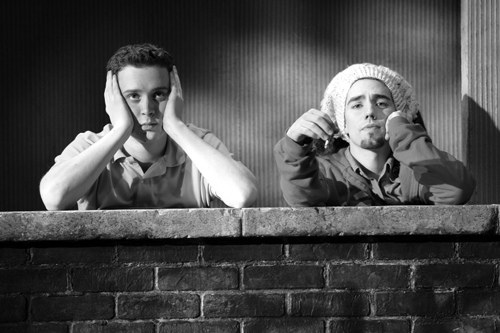Blockheads and big hair
Bridge and Tunnel
Helen Hayes Theatre
240 W. 44th St.
Tue., Sun. 7 p.m.; Wed.-Sat. 8 p.m.;
Sat. 2 p.m.; Sun. 3 p.m.
$26.25-$86.25; 212-239-6200
Dog Sees God: Confessions of a Teenage Blockhead
Century Center for the Performing Arts
111 E. 15th St.
Mon., Wed., Thu. 8 p.m.; Fri.-Sun. 7 p.m.; Fri., Sat. 10 p.m.
$39.50-$65.00; 212-239-6200
In putting together “Bridge and Tunnel,” poet/playwright Sarah Jones demonstrates that she is an accomplished technician and mimic—and not very much more. Her ability to assume accents and to do them consistently is impressive. However, like any mechanical trick, it quickly loses its power to fascinate. In her drawn-out, 90-minute, one-woman show, Jones portrays a variety of characters who have come to a poetry slam in South Queens. They are all immigrants and have somehow come together through the Internet—the force of poetry being sufficient to eradicate all preconceptions, racial or religious stereotypes. Would that it were true.
It’s conceivable that Jones is trying to show the diverse fabric of New York, the immigrant experience, and the various ways that the artist in the accountant tries to find expression. But her characters are stock, the situations clichéd, and the poetry, when it’s there, is vacuous.
Jones tries to pull her disjointed show together by having one character after another approach the microphone, ostensibly to recite poetry. However, once given the mic, the majority of the characters seem to have something other than verse on their minds. And so we get the returned war vet, the cloying elderly Jewish woman, the frustrated rapper, and so on and so on. Far from revealing anything new about the characters or life in the city for an outsider, Jones trades in the easy and all-too-familiar surface of her characters. In interviews, Jones has said that she got her inspiration from watching people on the subway, and that’s exactly what this piece feels like—the shallow, fantasized stories about people we all create as we observe but do not experience the reality of the individuals we see.
Instead of legitimate emotional exploration, Jones trades on her audience’s predictable, liberal responses, and is just as guilty of using code words, familiar situations, and paper-thin characters to provoke a specific response as any rabid, right wing demagogue. It may work for a while, but it is shallow theater indeed. In fact, Jones has more in common with performers like Jackie Mason who pander to their audiences’ prejudices. One leaves “Bridge and Tunnel” wondering how this show could possibly have hoodwinked so many into thinking it has merit. It’s all in the sell.
“Dog Sees God” is a noxious little hate crime of a play that, like Jones’ clunker, has similarly been getting all sorts of accolades. I don’t see it. The play purports to follow the high school careers of a crowd remarkably similar to Charlie Brown and the rest of the crew from the classic “Peanuts” comic strip. This intellectually blank and juvenile exercise is all about an immature playwright, Bert V. Royal, showing off a nasty nihilistic streak and being provocative because he can.
For example, though they were raised in a world without evident adults, one wonders how Charlie Brown and pals, whose stock-in-trade was wisdom beyond their years and a soft-focus, Christian-based philosophy ready for comic strip consumption, managed to turn their nondescript suburb into “The Lord of the Flies” once they became teens
Because Royal is such an inept playwright, like Jones, he trades on his audiences’ knowledge of the Peanuts—just different enough to keep the trademark attorneys at bay, one supposes—characters to vent his cynicism, rather than exerting himself to really write characters. And so we have the slovenly Pig Pen turned into the OCD Matt, Charlie Brown turned into a hostile and aggressive bully, Linus into a tortured gay man, and Lucy into a psychotic incarcerated for attempted murder. The inconsistencies and hostilities steadily mount. We have oversexual and substance-abusing teens, violence against women and gays, and crudity that never rises above a high school mentality.
As playwrights such as Adam Rapp have consistently demonstrated, it is possible to make an audience uncomfortable and still achieve artistic ends, but Royal has no such talent, and the play seems something written by a disturbed teenager bent on being shocking. I guess there’s a market for this, too. I was appalled to hear the audience laugh at the gay kid being beaten up and women being treated with gratuitous violence. At the performance I saw, there was even a woman in the front row taking pictures of the TV stars in the cast—until she was stopped two-thirds of the way through the show.
Director Trip Cullman, who has proven himself capable of much better, has directed the screaming, hate-filled violence at a fever pitch. The cast delivers the mono-dimensional characters as written at a high pitch but with no real distinction, aside from an especially rancid and deeply embarrassing performance by Kelli Garner.
This is worthless and unnecessary theater, unredeemed by a cheesy gimmick at the end—Charlie Brown’s unseen pen pal is really God. If I believed any of this even for a moment, I would be profoundly depressed.
gaycitynews.com


































